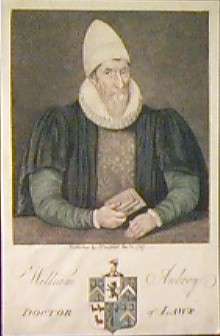William Aubrey
William Aubrey (c. 1529 – 25 June 1595) was Regius Professor of Civil Law at the University of Oxford from 1553 to 1559, and was one of the founding Fellows of Jesus College, Oxford. He was also a Member of Parliament for various Welsh and English constituencies between 1554 and 1592.
Dr William Aubrey MP | |
|---|---|
 William Aubrey | |
| Member of Parliament for Carmarthen Boroughs | |
| In office 1554 | |
| Member of Parliament for Brecon | |
| In office 1558 | |
| Member of Parliament for Hindon | |
| In office 1559 | |
| Member of Parliament for Arundel | |
| In office 1563–1567 | |
| Member of Parliament for Taunton | |
| In office 1593 | |
| Personal details | |
| Born | c. 1529 Brecknockshire |
| Died | 25 June 1595 London |
| Resting place | Old St Paul's Cathedral, London |
| Father | Thomas Aubrey, MD |
| Education | Christ College, Brecon |
| Alma mater | All Souls College, Oxford |
| Military service | |
| Battles/wars | St Quentin (1557) |
Early life and Oxford University
Aubrey was born in Brecknockshire, Wales, the second of Thomas Aubrey, MD, of Cantreff.
After being educated at what later became Christ College, Brecon, Aubrey went to Oxford University, becoming a Fellow of All Souls College, Oxford in 1547. He obtained a BCL degree in 1549 and was appointed Principal of New Inn Hall, Oxford in 1550. In 1553 he succeeded Robert Weston as Regius Professor of Civil Law. He held the position until 1559, when he was succeeded by John Griffith.[1] He served as judge-marshal of the army led by William Herbert, the Earl of Pembroke in the St. Quentin campaign of 1557.[2]
In 1571 he was named in the foundation charter as one of the original eight fellows of Jesus College, Oxford.[3] He obtained the degree of DCL in 1554 and the following year he was made a Master in Chancery.[1]
Legal and political work
_(State_1).jpg)
In 1562 Aubrey was a member of the commission set up by Matthew Parker, Archbishop of Canterbury that declared unlawful the marriage of Lady Catherine Grey to Henry Herbert (son of the 1st Earl of Pembroke). He was one of the signatories of the opinion that John Lesley (Bishop of Ross and an ambassador for Mary, Queen of Scots) could be tried in England for intriguing against Queen Elizabeth.[1]
He was MP for various constituencies: Carmarthen Boroughs (1554), Brecon (1558), Hindon (1559), Arundel (1563), and Taunton (1593). He was a member of the Council of Wales and the Marches from 1586. He was also auditor and vicar-general of the Province of Canterbury under Archbishop Grindal, retaining his position as vicar-general under Archbishop Whitgift.[1]
Death
Aubrey died in London, England in 1595 and was buried in Old St Paul's Cathedral.[4]
References
- Watkin, Thomas Glyn (January 2008). "Aubrey, William (c.1529–1595)". Oxford Dictionary of National Biography (online edition, subscription required). Oxford University Press. Retrieved 24 February 2008. The first edition of this text is available at Wikisource: . Dictionary of National Biography. London: Smith, Elder & Co. 1885–1900.
- "AUBREY, William (1529-95), of Cantreff, Brec., Doctors' Commons, London and Sydenham, Kent". History of Parliament Online. Retrieved 25 November 2012.
- "The Founders". jesus.ox.ac.uk. Retrieved 12 October 2018.
- "Memorials of St Paul's Cathedral" |Sinclair, W. p99: London; Chapman & Hall, Ltd; 1909
| Parliament of England | ||
|---|---|---|
| Preceded by Gruffydd Williams |
Member of Parliament for Carmarthen Boroughs 1554 |
Succeeded by John Parry |
| Preceded by unknown |
Member of Parliament for Brecon 1558 |
Succeeded by Rowland Vaughan |
| Preceded by John Gibbon Henry Jones |
Member of Parliament for Hindon 1559 With: Henry Jones |
Succeeded by John Foster George Acworth |
| Preceded by Sir Francis Knollys Thomas Heneage |
Member of Parliament for Arundel 1563–1567 With: Sir John St. Leger |
Succeeded by Thomas Browne Michael Heneage |
| Preceded by Thomas Fisher John Goldwell |
Member of Parliament for Taunton 1593 With: John Davidge |
Succeeded by Edward Barker Edward Hext |